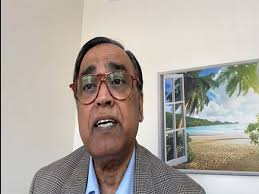LONDON: Following the recent terror attack in Pahalgam, Jammu and Kashmir, which resulted in the loss of 26 lives, the World Sindhi Congress has sharply condemned Pakistan’s role in “sponsoring terrorism” and accused it of longstanding injustices against Sindh’s people regarding Indus water.
Speaking to reporters, Hidayat Bhutto, UK and Europe Organiser of the World Sindhi Congress, highlighted the ongoing marginalisation of Sindh with respect to the Indus waters.
“We strongly condemn the terror incident in Pahalgam, where innocent lives were lost,” Bhutto said. He squarely blamed Pakistan for providing safe havens to UN-designated terrorists like Hafiz Saeed and Masood Azhar, stating, “Pakistan sponsors terrorism across the world, and UN-designated terrorists like Hafiz Saeed, Masood Azhar, and hundreds of others are provided safe havens by them. They carry out terror activities from their territory.”
Turning attention to the water-sharing dispute, Bhutto emphasised that Sindh had no representation in the Indus Waters Treaty of 1960. “Pakistan does not represent Sindh even today,” he stated. “Pakistan has never thought about the interests of Sindh they are only concerned about the Punjab province.”
He pointed out that prior to the formation of Pakistan in 1947, Sindh’s Sindhu Delta was among the most prosperous deltas in the world, characterised by flourishing agriculture, abundant natural resources, and widespread prosperity among its people. However, he lamented that following the country’s creation, the region has faced relentless degradation. According to Bhutto, historic water-sharing records from 1945 showed that five rivers from Punjab used to merge into Sindh, with Sindh receiving 25 percent of the water share. The Indus River itself, he stressed, was vital to Sindh’s survival and prosperity.
“The Indus River water was solely for Sindh, and the region was prosperous,” he explained. However, after the signing of the Indus Water Treaty — under which two rivers were allocated to India and three remained with Pakistan, including the Indus — the Pakistani government initiated a massive drive to construct dams and barrages. These constructions, Bhutto said, devastated the Sindhu Delta by cutting off the river’s natural flow to the sea, leading to severe environmental destruction and economic hardship across Sindh.
Expanding on the current situation, Bhutto voiced deep concerns over Punjab’s ongoing construction of six new canals. He said the move has sparked widespread protests across Sindh, where resentment has been brewing for decades. “Punjab has historically broken its promises,” Bhutto asserted, explaining how canals that were supposed to open only during floods were fraudulently kept open permanently, diverting vital water away from Sindh. “They pledged to open certain canals only during floods, but they committed fraud by keeping them open permanently, leading to water theft from Sindh.”
Accusing Pakistan of blatant injustice, he stressed that Sindh’s very survival depends on the Indus River, noting that even the name “India” is derived from the Indus. “Pakistan only cares about the interests of Punjab and has no concern if Sindh is destroyed,” he added. “They hardly care about Sindh’s survival.”
Looking ahead, Bhutto made a firm call for justice: he demanded that any future treaties regarding the Indus must include separate and direct representation for Sindh, accompanied by binding international guarantees to protect the ecological and human rights of the Sindhi people. “We urge that in any future agreements, Sindh must have separate and direct representation to ensure that our interests are protected,” he said, emphasising the need for international oversight.
He concluded by warning of the dire consequences of continued water mismanagement, highlighting the urgent need to revive the Sindhu Delta to stave off an impending drought. “The revival of the Sindhu Delta is essential to prevent a looming drought and to restore prosperity to our region,” Bhutto said.


